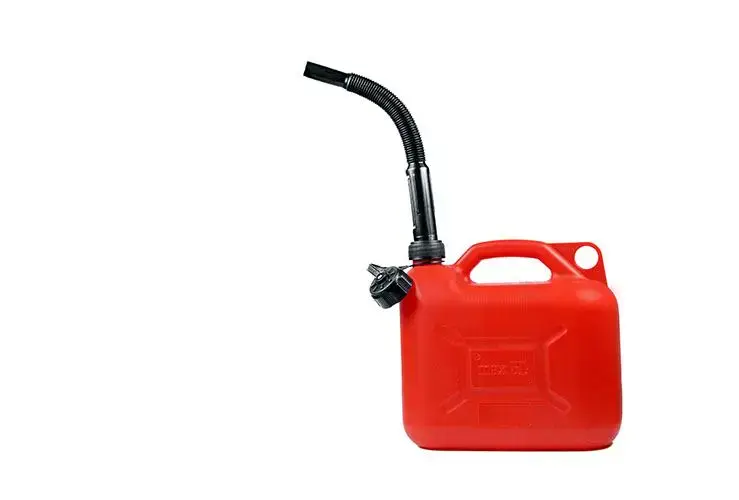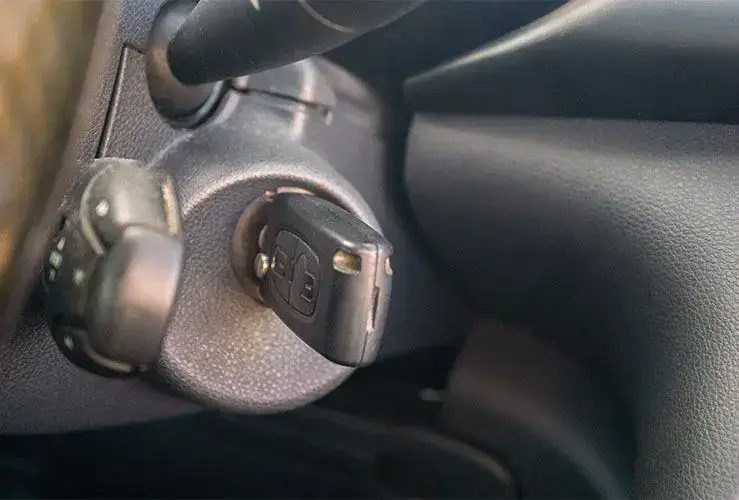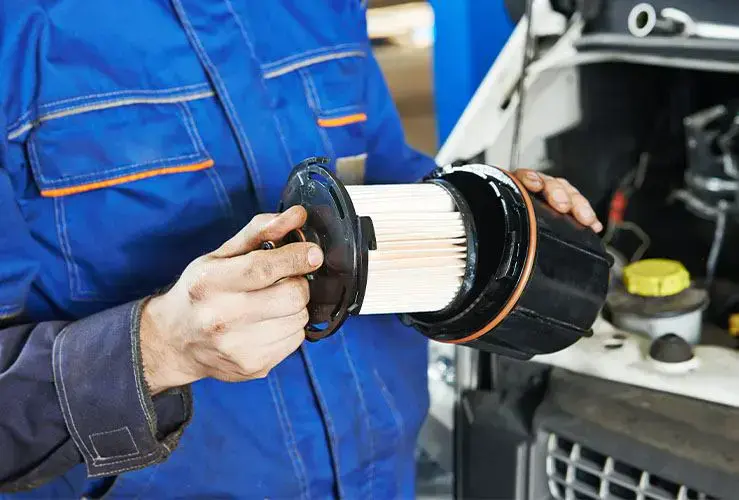When you turn the ignition of your car and nothing happens - you know it's going to be one of those days. It could mean being late for work, appointments, or social engagements.
It means you need to find a solution as to why your car won't start - quickly. Some of these may be easily solved by the roadside, others might require a tow truck.
Understanding Starter Motor Issues
A failing starter motor may show several warning signs before completely failing:
- Clicking sounds when turning the key or pressing the start button.
- No cranking or a slow crank when attempting to start the engine.
- Smoke or burning smell, suggesting overheating from repeated failed attempts.
- Oil-soaked motor, indicating an external leak may be damaging the unit.
It’s also worth checking the connections to the starter motor and whether the ignition switch is functioning properly. Faulty ignition switches can prevent voltage from reaching the starter, causing your car to stay silent when attempting to start.
Why won't my car start?
Here are some of the most common reasons cars won't start, with remedies.
Note: You should always check your vehicle handbook for any fault remedy before carrying out any work on your vehicle, and always bear in mind the safety of all parties situated near your vehicle. If you are unsure of what is required to fix any problems, please consult a professional.

Flat or faulty battery
Battery issues are the leading cause of breakdowns in the UK, accounting for roughly 35% of all call‑outs during winter, according to DirectLine Group.
Why do car batteries go flat?
Most car batteries go flat because they haven’t been given the chance to charge properly. Car batteries naturally lose some of their charge over time and not using your vehicle for a while or just undertaking short journeys can fail to give the battery the sufficient time to repower.
Flat car batteries can also be the result of having left on an electrical component on your vehicle, such as your lights (so be sure to check those beams are switched off at the end of each journey), or even the cold weather, as it slows down the chemical reaction inside of the battery, reducing the battery’s ability to hold a charge.
It could also just be that your car battery is old and coming to the end of its life, or that it is faulty, so struggles to charge. Issues such as corroded battery terminals can interfere with the connection, leading to the car failing to start.
How can you tell if your car battery is flat?
When your car battery is flat you will find that as well as not being able to start up the engine, none of the vehicles electrical systems will work. If your car radio or hands-free system won’t power up, the likelihood is that your battery is flat.
Can you fix a flat car battery?
You may be able to fix a flat battery by attaching jump leads to another vehicle with a fully-charged battery and jump-starting your car.
After the jump-start, you need to drive your car for at least 30 minutes to recharge the battery. Turn off all unnecessary electronic equipment.
Later, use a battery charger to bring your battery back to top condition. Battery conditioners/trickle chargers can help keep your battery in good condition and are also ideal if your car is not being used for a long period.
Fuel issues
Run out of fuel?
Your car won't start if you have run out of fuel. Obtain a fuel can and fill it up at a fuel station, before adding the fuel to your car's tank.
What if I fill my car with the wrong fuel?
Misfuelling can also be a cause for your car not starting. If you’ve put the wrong fuel in your car, you’ll need to drain the fuel system before you drive. Your car breakdown insurance provider may be able to assist.
All Start Rescue breakdown cover policies come with misfuel cover as standard. Find out more about our misfuel cover here.

Ignition jam/wheel lock
If your car won't start because you can’t turn the ignition key, your vehicle steering lock may be jammed. This is commonly caused by the car's wheel being tight against a kerb or other object.
There are two solutions you can try in an attempt to resolve a jammed steering wheel lock issue:
- Solution one: turn the steering wheel gently left to right while turning the ignition key.
- Solution Two: if this doesn't work, carefully release the handbrake and let the vehicle move a short distance from the kerb, then try again.

Faulty immobiliser/security system
Your immobiliser may fail to recognise your key, preventing the vehicle from starting. This is often caused by a dead key fob battery.
What can I do to start my car if my key fob isn’t working?
If possible, replace the battery. Alternatively, if a battery replacement is not possible, try holding your fob against the start button and pressing it at the same time. If your car does not have a start button, hold the key fob up against the ignition as you turn the key.
You can also try a spare key if you have one to hand. If the spare key also doesn’t start the car, you may need to reprogram the fob manually, or with the assistance of your dealer.
Faulty starter motor
The starter motor is an electronic device connected to your battery, which starts your car's engine when you turn the ignition.
If your battery is fully charged and you hear a clicking sound, your starter motor probably has a fault and you'll need to visit your local garage.
Blocked fuel filter
What is a fuel filter?
A fuel filter helps to optimise your car engine’s performance through preventing dirt and other debris from clogging your vehicle's fuel delivery system.
What happens if a fuel filter becomes blocked?
The fuel filter itself can become blocked and prevents petrol or diesel from reaching your engine, meaning that your car won’t start. If you would like to know when you should replace your filter, take a look at more information here.
Can I prevent my fuel filter from clogging?
To prevent clogging in your fuel filter, you should aim to have the filter on your car changed every 15,000 to 20,000 miles.

Flooded engine
Issues with flooded engines are less common now as most modern cars are fitted with fuel injection systems.
However, it still does happen; mostly on high-mileage, used cars where the fuel intake system isn’t in its prime condition anymore and in older cars where there is a carburettor instead of a fuel injection system.
What is a flooded engine and why does it happen?
A flooded engine means that there is too much fuel and not enough air in your engine.
The issue usually occurs with cars which have cold engines, after being driven a short distance, stopped, then re-started, in situations such as when swapping the positioning of your cars on the driveway or moving a vehicle into and out of a garage.
As such, flooded engine issues are more common on cool or colder days when the engine needs more fuel to run smoothly until it's warmed up.
Can you fix a flooded engine?
A flooded engine happens when there’s too much fuel and not enough air reaching the combustion chamber. This usually prevents the engine from firing properly and can be particularly common in older vehicles or after short, low-speed journeys, especially in cold weather.
If your car won't start but you smell unburnt fuel or the engine cranks without catching, it may be flooded. In that case, follow these steps to try and clear the excess fuel and get back on the road:
What to Do If Your Engine is Flooded
- Switch off the ignition. Ensure the car is in park (automatic) or neutral (manual gearbox), and the handbrake is applied.
- Press the accelerator pedal fully to the floor.
This tells the fuel system to stop injecting more fuel while starting. - Turn the key in the ignition (or press the start button) and crank the engine for about 5 seconds.
Keep your foot on the accelerator during this attempt. Be careful not to do this for too long, else you could drain your battery. - If the engine doesn’t start, wait 30 seconds and try again.
Avoid repeated rapid attempts, as this can drain the battery or overheat the starter motor. - Once the engine starts, lift your foot off the accelerator and allow the engine to idle.
Let it run for a few minutes to stabilise and burn off excess fuel. - If it still won’t start after 3–4 attempts, call a breakdown service for assistance.
Troubleshooting tips:
- Avoid over-cranking the engine – repeated attempts may flatten the battery.
- If the issue happens frequently, your fuel injection or ignition system may need professional inspection.
- Use fresh fuel where possible – stale fuel can increase the chances of flooding.
- If in doubt, always call your breakdown provider or mechanic for further diagnosis.
What does it mean when my car won't start but my battery and alternator are fine?
Commonly, a car won’t start due to a flat battery or a faulty alternator. But when these have been ruled out, you need to look at other possibilities - some of which are common car problems mentioned above.
You may for example have a problem with your starter motor. A starter may stop working for a number of reasons, including faults with the internal windings, damaged brushes, bad bearings, and teeth that no longer mesh properly in the starter or gear ring.
Dirty starter cables may also prevent the starter motor from functioning. You can clean these yourself with an old toothbrush/wire wool and some vinegar (for safety reasons, the negative battery cable must be disconnected before the positive). If unsure, ask a professional to do it for you.
And as mentioned, a fuel issue may also prevent your vehicle from starting. You may have insufficient fuel to start the engine, or even have put the wrong fuel inside (e.g. diesel in a petrol engine).
A jammed steering lock is another possibility, as is a faulty security/immobiliser fault, which may fail to recognise your key. Car immobiliser problems can prevent starting, especially if the key fob is faulty.
On older cars, a flooded engine could be a possibility (see above).
Car still won't start?
Call your breakdown service provider.
If you don't have car breakdown insurance, providers - including our team here at Start Rescue - can still arrange for roadside assistance.
Call us on 01206 655000 and get covered, or buy online by clicking on the link below.
Frequently Asked Questions
Generally speaking, you should replace your battery every three to five years. However, this can vary depending on use and weather conditions.
Yes, cold weather can reduce battery efficiency. Hot weather can also cause components to overheat, leading to car starting issues.
As long as it's safe to do so, stay with your vehicle and call for breakdown assistance. If possible, try jump-starting a car battery or check for obvious issues like a loose fuel cap
No, you should not jump-start a hybrid or electric vehicle. Consult your vehicle handbook or call your breakdown provider.
Yes, a faulty alternator can prevent your car from starting. It may not charge the battery correctly, leading to car starting issues.
Check your fuse box (usually found under the dashboard or bonnet).
Locate the starter fuse based on your vehicle’s diagram.
Remove and inspect the fuse – a broken or burnt wire inside signals it needs replacement.
If in doubt, call a qualified technician to avoid electrical damage.
Yes. The alternator charges the battery and powers your car’s electrical systems while running. A failing alternator can’t recharge the battery properly, leading to frequent starting issues.
Signs of a failing alternator include dimming headlights, warning lights on the dashboard, and electrical accessories not working.





